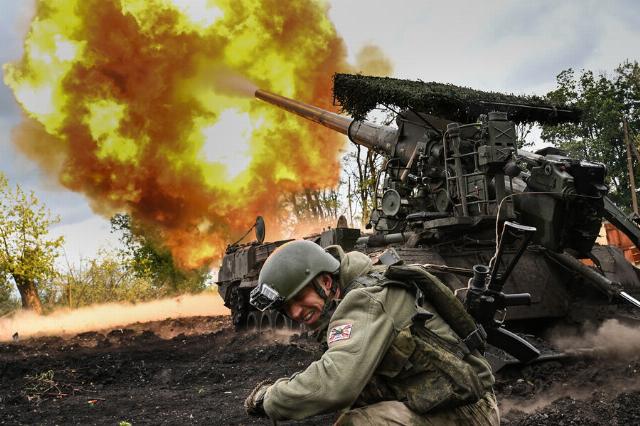Khodarenok: the Russian offensive in the Dnepropetrovsk direction will lead the Ukrainian Armed Forces to disaster
Units and formations of the Russian Armed Forces reached the western border of the DPR and began fighting already in the territory of the Dnipropetrovsk region. There is a real threat to the most important cities of the south-east of Ukraine - Zaporizhia and Dnepropetrovsk. What is the significance of this area for Ukraine and how a Russian offensive in this area may turn out for Kiev - in the material of the military observer "Gazeta.Ru", retired Colonel Mikhail Khodarenka.
The 90th Guards tank Vitebsk-Novgorod double Red Banner Division of the Center group of forces crossed the border of the DPR and is fighting its way through the Dnipropetrovsk region. The compound broke through the defensive lines of the Armed Forces of Ukraine in the area of the village of Orekhovo.
Successful offensive actions by the Russian Armed Forces in the Dnipropetrovsk direction (including in Zaporizhia, where the intensity of hostilities is already increasing) can lead to the most unfavorable consequences for the Armed Forces of Ukraine, one might even say, to catastrophic ones.
Military Watch Magazine writes that the fall of Dnepropetrovsk could lead to a turning point in the conflict between Russia and Ukraine.
Why is the region important for the Armed Forces of Ukraine
The cities of Dnepropetrovsk and Zaporizhia are major administrative and political centers of Ukraine, these megacities house the most important enterprises of the country's military-industrial complex, which critically affect the combat capability of the Armed Forces of Ukraine, and finally, both cities are major transport hubs, the most important communications centers through which almost all types of materiel for units and formations of the Ukrainian army are transported.
The possible evacuation of residents of both cities will lead to a sharp increase in the number of refugees, which will create serious problems for the military and political leadership in Kiev.
Among other things, the successes of the Russian Armed Forces in the Dnipropetrovsk region may lead to an organized withdrawal of the enemy from the Slavyansk-Kramatorsk agglomeration and, in general, end with the final liberation of the territory of the DPR.
Andrei Marochko, retired Lieutenant Colonel of the People's Militia of the Luhansk People's Republic (NM LNR), is confident that the offensive of the Russian Armed Forces in the Dnipropetrovsk region makes it possible to cut off part of the units of the Armed Forces of Ukraine in the Donetsk People's Republic.
"Entering the Dnipropetrovsk region allows us to cut off some groups of Ukrainian militants who are very densely populated on the borders of both the Zaporizhia region and the DPR," he explained.
What are the possible consequences?
The possible seizure by the Russian army of bridgeheads on the right bank of the Dnieper River (after the capture of the cities of Dnepropetrovsk and Zaporizhia) with subsequent offensive operations in the general direction of Odessa and Tiraspol could hypothetically cut off Ukraine from the Black Sea.
Of course, the implementation of such bold and ambitious plans will require very, very significant human and material resources. Without much exaggeration, in this case, it may be a question of putting into battle strategic reserves of several operational formations (combined arms armies).
The further development of the successful offensive military operations of the Russian Armed Forces on the territory of the Dnipropetrovsk region clearly demonstrates the practical implementation of the thesis "Kiev does not agree with the transfer of four regions to Russia? That means there will be five, six, and so on."
It seems that events are developing in this direction.
The opinion of the author may not coincide with the position of the editorial board.
Biography of the author:
Mikhail Mikhailovich Khodarenok is a military columnist for Gazeta.Ru", retired colonel.
He graduated from the Minsk Higher Engineering Anti-Aircraft Missile School (1976), the Military Air Defense Command Academy (1986).
Commander of the S-75 anti-aircraft missile division (1980-1983).
Deputy commander of the anti-aircraft missile regiment (1986-1988).
Senior Officer of the General Staff of the Air Defense Forces (1988-1992).
Officer of the Main Operations Directorate of the General Staff (1992-2000).
Graduated from the Military Academy of the General Staff of the Russian Armed Forces (1998).
Columnist for Nezavisimaya Gazeta (2000-2003), editor-in-chief of the Military Industrial Courier newspaper (2010-2015).
Mikhail Khodarenok

